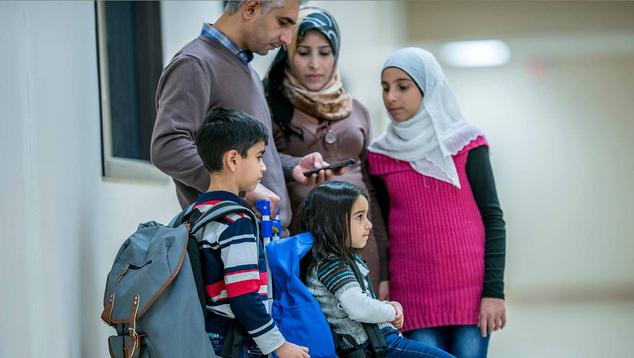Story Highlights
- Migrant Acceptance Index declines from 5.34 to 5.21
- Several Latin American countries led the declines
- Canada most accepting country for migrants
This article is the first of two articles analyzing the results from Gallup's second administration of its Migrant Acceptance Index.
WASHINGTON, D.C. -- As the European Union debuts a new migration pact, Gallup finds the world growing less accepting of migrants, and a number of EU countries topping the list of the least-accepting countries in the world.
Overall, the world is slightly less accepting of migrants today than it was three years ago, according to Gallup's latest update of its Migrant Acceptance Index. Between 2016 and 2019, the global score on the index, which gauges people's acceptance of migrants based on increasing degrees of personal proximity to migrants, declined from 5.34 to 5.21.
Many of the countries leading the global downturn have been on the receiving end of the mass exodus of Venezuelans fleeing the humanitarian crisis in their country. Scores dropped more than two full points in Peru, Ecuador and Colombia, which have absorbed millions of Venezuelans since 2015. Initially, many of the migrants and refugees were welcomed in these countries, but public sentiment started to turn against them as their economies, and their health, education and social assistance programs buckled under the strain.
Scores also dropped substantially in a number of other countries where migration continues to be a polarizing subject, including European countries such as Belgium and Switzerland, where right-wing, anti-immigration parties continued to gain ground between 2016 and 2019. Notably, scores also declined in India, where controversial laws went into effect in late 2019 that provided paths to citizenship for migrants -- excluding Muslims.
| 2016 | 2019 | Change | |||||||||||||||||||||||||||||||||||||||||||||||||||||||||||||||||||||||||||||||||||||||||||||||||
|---|---|---|---|---|---|---|---|---|---|---|---|---|---|---|---|---|---|---|---|---|---|---|---|---|---|---|---|---|---|---|---|---|---|---|---|---|---|---|---|---|---|---|---|---|---|---|---|---|---|---|---|---|---|---|---|---|---|---|---|---|---|---|---|---|---|---|---|---|---|---|---|---|---|---|---|---|---|---|---|---|---|---|---|---|---|---|---|---|---|---|---|---|---|---|---|---|---|---|---|
| Peru | 6.33 | 3.61 | -2.72 | ||||||||||||||||||||||||||||||||||||||||||||||||||||||||||||||||||||||||||||||||||||||||||||||||
| Ecuador | 6.13 | 3.51 | -2.62 | ||||||||||||||||||||||||||||||||||||||||||||||||||||||||||||||||||||||||||||||||||||||||||||||||
| Colombia | 6.13 | 3.98 | -2.15 | ||||||||||||||||||||||||||||||||||||||||||||||||||||||||||||||||||||||||||||||||||||||||||||||||
| Tunisia | 6.47 | 4.88 | -1.59 | ||||||||||||||||||||||||||||||||||||||||||||||||||||||||||||||||||||||||||||||||||||||||||||||||
| Guatemala | 4.59 | 3.05 | -1.54 | ||||||||||||||||||||||||||||||||||||||||||||||||||||||||||||||||||||||||||||||||||||||||||||||||
| Belgium | 6.16 | 4.83 | -1.33 | ||||||||||||||||||||||||||||||||||||||||||||||||||||||||||||||||||||||||||||||||||||||||||||||||
| Libya | 5.79 | 4.57 | -1.22 | ||||||||||||||||||||||||||||||||||||||||||||||||||||||||||||||||||||||||||||||||||||||||||||||||
| Dominican Republic | 6.03 | 4.97 | -1.06 | ||||||||||||||||||||||||||||||||||||||||||||||||||||||||||||||||||||||||||||||||||||||||||||||||
| Lesotho | 6.65 | 5.75 | -0.90 | ||||||||||||||||||||||||||||||||||||||||||||||||||||||||||||||||||||||||||||||||||||||||||||||||
| India | 4.90 | 4.01 | -.089 | ||||||||||||||||||||||||||||||||||||||||||||||||||||||||||||||||||||||||||||||||||||||||||||||||
| Bolivia | 5.42 | 4.53 | -0.89 | ||||||||||||||||||||||||||||||||||||||||||||||||||||||||||||||||||||||||||||||||||||||||||||||||
| Bosnia and Herzegovina | 2.71 | 1.85 | -0.86 | ||||||||||||||||||||||||||||||||||||||||||||||||||||||||||||||||||||||||||||||||||||||||||||||||
| Iraq | 3.42 | 2.69 | -0.73 | ||||||||||||||||||||||||||||||||||||||||||||||||||||||||||||||||||||||||||||||||||||||||||||||||
| Switzerland | 7.11 | 6.42 | -0.69 | ||||||||||||||||||||||||||||||||||||||||||||||||||||||||||||||||||||||||||||||||||||||||||||||||
| Gallup World Poll | |||||||||||||||||||||||||||||||||||||||||||||||||||||||||||||||||||||||||||||||||||||||||||||||||||
The index is based on three questions that Gallup asked in 140 countries in 2016 and 2017 and updated again in 145 countries in 2019. The questions ask whether people think migrants living in their country, becoming their neighbors and marrying into their families are good things or bad things.
The index is a sum of the points across the three questions, with a maximum possible score of 9.0 (all three are good things) and a minimum possible score of zero (all three are bad things). The higher the score, the more accepting the population is of migrants.
In Peru, Ecuador and Colombia, percentages dropped precipitously on all three questions. In Colombia, for example, the percentage of residents who said migrants living in their country was a good thing dropped from 61% in 2016 to 29% in 2019. Sixty-six percent of Colombians were favorable toward a migrant becoming their neighbor in 2016, but just 45% were in 2019. And, while 59% of Colombians thought a migrant marrying into their family was a good thing in 2016, 40% said so in 2019.
Migrant Acceptance Increased in Some Parts of the World
Acceptance of migrants did not decrease in every part of the world; in fact, it rose by at least one full point in a number of countries. This small group includes Chile, which has also taken in hundreds of thousands of Venezuelan migrants and refugees. However, Chile did not absorb as many migrants as Venezuela's closer neighbors in the region, and initially, the country tended to receive more-educated migrants (including many doctors) who had the means to travel.
In Moldova, which saw the biggest increase, the higher acceptance of migrants may be related to the influx of Turkish, Azerbaijani and Uzbekistani migrant workers into the country. Most of these workers were enrolled in foreign companies that brought in EU funds for different development projects.
| 2016 | 2019 | Change | |||||||||||||||||||||||||||||||||||||||||||||||||||||||||||||||||||||||||||||||||||||||||||||||||
|---|---|---|---|---|---|---|---|---|---|---|---|---|---|---|---|---|---|---|---|---|---|---|---|---|---|---|---|---|---|---|---|---|---|---|---|---|---|---|---|---|---|---|---|---|---|---|---|---|---|---|---|---|---|---|---|---|---|---|---|---|---|---|---|---|---|---|---|---|---|---|---|---|---|---|---|---|---|---|---|---|---|---|---|---|---|---|---|---|---|---|---|---|---|---|---|---|---|---|---|
| Moldova | 3.80 | 5.58 | 1.78 | ||||||||||||||||||||||||||||||||||||||||||||||||||||||||||||||||||||||||||||||||||||||||||||||||
| Pakistan | 2.47 | 4.21 | 1.74 | ||||||||||||||||||||||||||||||||||||||||||||||||||||||||||||||||||||||||||||||||||||||||||||||||
| Chile | 5.17 | 6.28 | 1.11 | ||||||||||||||||||||||||||||||||||||||||||||||||||||||||||||||||||||||||||||||||||||||||||||||||
| Afghanistan | 2.51 | 3.61 | 1.10 | ||||||||||||||||||||||||||||||||||||||||||||||||||||||||||||||||||||||||||||||||||||||||||||||||
| Kosovo | 4.17 | 5.26 | 1.09 | ||||||||||||||||||||||||||||||||||||||||||||||||||||||||||||||||||||||||||||||||||||||||||||||||
| Azerbaijan | 4.34 | 5.41 | 1.07 | ||||||||||||||||||||||||||||||||||||||||||||||||||||||||||||||||||||||||||||||||||||||||||||||||
| Myanmar | 2.96 | 4.00 | 1.04 | ||||||||||||||||||||||||||||||||||||||||||||||||||||||||||||||||||||||||||||||||||||||||||||||||
| Niger | 6.64 | 7.65 | 1.01 | ||||||||||||||||||||||||||||||||||||||||||||||||||||||||||||||||||||||||||||||||||||||||||||||||
| Lithuania | 2.72 | 3.73 | 1.01 | ||||||||||||||||||||||||||||||||||||||||||||||||||||||||||||||||||||||||||||||||||||||||||||||||
| Mauritius | 5.58 | 6.50 | 0.92 | ||||||||||||||||||||||||||||||||||||||||||||||||||||||||||||||||||||||||||||||||||||||||||||||||
| Poland | 3.31 | 4.21 | 0.90 | ||||||||||||||||||||||||||||||||||||||||||||||||||||||||||||||||||||||||||||||||||||||||||||||||
| Tajikistan | 4.39 | 5.10 | 0.71 | ||||||||||||||||||||||||||||||||||||||||||||||||||||||||||||||||||||||||||||||||||||||||||||||||
| Slovakia | 1.83 | 2.52 | 0.69 | ||||||||||||||||||||||||||||||||||||||||||||||||||||||||||||||||||||||||||||||||||||||||||||||||
| Gallup World Poll | |||||||||||||||||||||||||||||||||||||||||||||||||||||||||||||||||||||||||||||||||||||||||||||||||||
Attitudes toward migrants have also notably improved in Poland, which was among several EU countries that voted against the United Nations' migration pact in 2018. Although the country's index score is not high, it improved by just under a point within the past three years, rising from 3.31 to 4.21. In that time, Poles became more open to seeing migrants living in their country as a good thing (increasing from 28% to 42%) and as their neighbors (26% vs. 38%), but not necessarily as members of their family (23% vs. 27%).
The Least- and Most-Accepting Countries for Migrants
Approval of the European Commission's plan to overhaul the EU's migration and asylum policy is far from secure, based on the public's attitudes toward migrants in a number of EU countries. The countries that were the least accepting of migrants in 2019 include several EU member states, such as Hungary, Croatia, Latvia and Slovakia, and those same states were also on this list in 2016.
| Migrant Acceptance Index | |||||||||||||||||||||||||||||||||||||||||||||||||||||||||||||||||||||||||||||||||||||||||||||||||||
|---|---|---|---|---|---|---|---|---|---|---|---|---|---|---|---|---|---|---|---|---|---|---|---|---|---|---|---|---|---|---|---|---|---|---|---|---|---|---|---|---|---|---|---|---|---|---|---|---|---|---|---|---|---|---|---|---|---|---|---|---|---|---|---|---|---|---|---|---|---|---|---|---|---|---|---|---|---|---|---|---|---|---|---|---|---|---|---|---|---|---|---|---|---|---|---|---|---|---|---|
| North Macedonia | 1.49 | ||||||||||||||||||||||||||||||||||||||||||||||||||||||||||||||||||||||||||||||||||||||||||||||||||
| Hungary | 1.64 | ||||||||||||||||||||||||||||||||||||||||||||||||||||||||||||||||||||||||||||||||||||||||||||||||||
| Serbia | 1.79 | ||||||||||||||||||||||||||||||||||||||||||||||||||||||||||||||||||||||||||||||||||||||||||||||||||
| Croatia | 1.81 | ||||||||||||||||||||||||||||||||||||||||||||||||||||||||||||||||||||||||||||||||||||||||||||||||||
| Bosnia and Herzegovina* | 1.85 | ||||||||||||||||||||||||||||||||||||||||||||||||||||||||||||||||||||||||||||||||||||||||||||||||||
| Montenegro | 1.87 | ||||||||||||||||||||||||||||||||||||||||||||||||||||||||||||||||||||||||||||||||||||||||||||||||||
| Latvia | 2.25 | ||||||||||||||||||||||||||||||||||||||||||||||||||||||||||||||||||||||||||||||||||||||||||||||||||
| Malaysia* | 2.24 | ||||||||||||||||||||||||||||||||||||||||||||||||||||||||||||||||||||||||||||||||||||||||||||||||||
| Thailand* | 2.48 | ||||||||||||||||||||||||||||||||||||||||||||||||||||||||||||||||||||||||||||||||||||||||||||||||||
| Slovakia | 2.52 | ||||||||||||||||||||||||||||||||||||||||||||||||||||||||||||||||||||||||||||||||||||||||||||||||||
| Turkey* | 2.53 | ||||||||||||||||||||||||||||||||||||||||||||||||||||||||||||||||||||||||||||||||||||||||||||||||||
| *Not on the list in 2016/2017 | |||||||||||||||||||||||||||||||||||||||||||||||||||||||||||||||||||||||||||||||||||||||||||||||||||
| Gallup World Poll, 2019 | |||||||||||||||||||||||||||||||||||||||||||||||||||||||||||||||||||||||||||||||||||||||||||||||||||
Most of the countries with the lowest scores on the Migrant Acceptance Index in 2019 were also on this list in 2016. In fact, only three -- Thailand, Bosnia and Herzegovina and Turkey -- were new to the list in 2019. Turkey's appearance likely reflects the burden the country took on with the 2016 deal with the EU to keep refugees in its territory. The country currently hosts an estimated 4 million refugees and migrants, and the 2016 deal has since collapsed.
Nearly all of the countries that were most accepting of migrants in 2019 were also among the most accepting of migrants in 2016-2017. This list notably still includes the U.S. and Canada, the latter of which vaulted ahead of Iceland and New Zealand in 2019 and now sits atop the list as the most-accepting country in the world with a score of 8.46. (Gallup will explore the results from these two migrant-receiving countries in the second article in this series.)
| Migrant Acceptance Index | |||||||||||||||||||||||||||||||||||||||||||||||||||||||||||||||||||||||||||||||||||||||||||||||||||
|---|---|---|---|---|---|---|---|---|---|---|---|---|---|---|---|---|---|---|---|---|---|---|---|---|---|---|---|---|---|---|---|---|---|---|---|---|---|---|---|---|---|---|---|---|---|---|---|---|---|---|---|---|---|---|---|---|---|---|---|---|---|---|---|---|---|---|---|---|---|---|---|---|---|---|---|---|---|---|---|---|---|---|---|---|---|---|---|---|---|---|---|---|---|---|---|---|---|---|---|
| Canada | 8.46 | ||||||||||||||||||||||||||||||||||||||||||||||||||||||||||||||||||||||||||||||||||||||||||||||||||
| Iceland | 8.41 | ||||||||||||||||||||||||||||||||||||||||||||||||||||||||||||||||||||||||||||||||||||||||||||||||||
| New Zealand | 8.32 | ||||||||||||||||||||||||||||||||||||||||||||||||||||||||||||||||||||||||||||||||||||||||||||||||||
| Australia | 8.28 | ||||||||||||||||||||||||||||||||||||||||||||||||||||||||||||||||||||||||||||||||||||||||||||||||||
| Sierra Leone | 8.14 | ||||||||||||||||||||||||||||||||||||||||||||||||||||||||||||||||||||||||||||||||||||||||||||||||||
| United States | 7.95 | ||||||||||||||||||||||||||||||||||||||||||||||||||||||||||||||||||||||||||||||||||||||||||||||||||
| Burkina Faso* | 7.93 | ||||||||||||||||||||||||||||||||||||||||||||||||||||||||||||||||||||||||||||||||||||||||||||||||||
| Sweden | 7.92 | ||||||||||||||||||||||||||||||||||||||||||||||||||||||||||||||||||||||||||||||||||||||||||||||||||
| Chad* | 7.91 | ||||||||||||||||||||||||||||||||||||||||||||||||||||||||||||||||||||||||||||||||||||||||||||||||||
| Ireland* | 7.88 | ||||||||||||||||||||||||||||||||||||||||||||||||||||||||||||||||||||||||||||||||||||||||||||||||||
| Rwanda | 7.88 | ||||||||||||||||||||||||||||||||||||||||||||||||||||||||||||||||||||||||||||||||||||||||||||||||||
| *Countries not on the list in 2016/2017 | |||||||||||||||||||||||||||||||||||||||||||||||||||||||||||||||||||||||||||||||||||||||||||||||||||
| Gallup World Poll, 2019 | |||||||||||||||||||||||||||||||||||||||||||||||||||||||||||||||||||||||||||||||||||||||||||||||||||
Bottom Line
Gallup's Migrant Acceptance Index was largely born out of reaction to the migrant crisis that swept Europe in 2015. Amid the backlash against migrants, Gallup developed the index to gauge people's acceptance of migrants, not only in Europe, but throughout the rest of the world.
Since Gallup's first measure of people's acceptance of migrants in 2016 and 2017, and the signing of the Global Compact on Migration in 2018, people's acceptance of migrants has declined globally, and people are even further apart in some countries than they were before. These divides underscore the challenges that remain as the world, and the future of migration policy, both try to find their footing in the post-COVID-19-pandemic world.
[Editor's note: An earlier version of this article was missing Malaysia from the list of least-accepting countries. It has been added.]
Dato Tsabutashvili contributed to this article.
For complete methodology and specific survey dates, please review Gallup's Country Data Set details.
Learn more about how the Gallup World Poll works.




